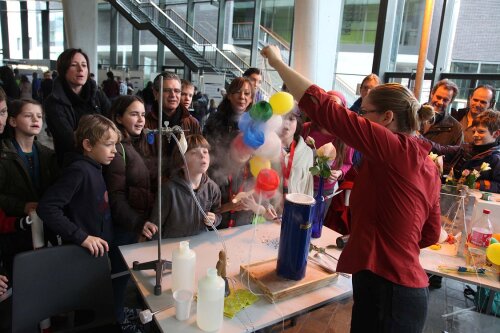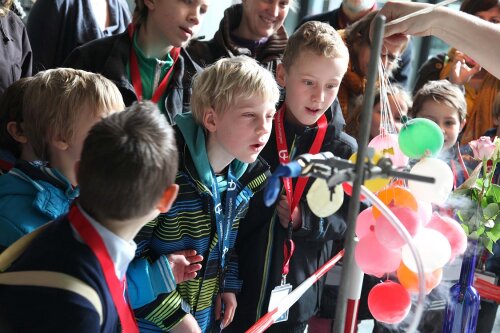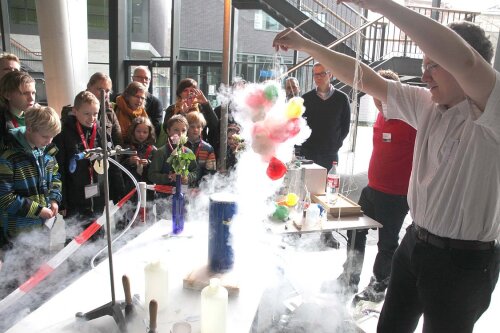Children's University
Each year, the University of Antwerp organizes the Children's University, a day dedicated to children between 8 and 11 years old, but interesting for all ages. Our research group participates every time with our "Cold, Colder, Coldest" show.
Using liquid nitrogen, with a temperature of only -196°C (-321°F), we show children that the world is more complicated than just the little part we experience every day. The properties of solids, gases and liquids change when cooled: roses breaking like glass, balloons that seem to deflate, bells that sound better, … It doesn't take long for children to understand that there's more going on than what happens in a refrigerator. From there we take them on a short journey to even lower temperatures, where even a vacuum flask is no longer useful. With levitating magnets we show them how to trap such cold atoms. And then, it happens: we find a new physical state: no longer a solid, nor a gas, nor a liquid. Something new and unfamiliar. We call it a BEC ...



Experiments in science: school visits
For several years, the faculty of Science has organised Studio STEM in early spring (februari-april). This initiative offers (classes of) students in the final stage of their secondary education the chance to participate in laboratory sessions and trial lessons at the University of Antwerp. This way, they encounter science that is just beyond the reach of normal secondary school lessons. During the years, these visits have become increasingly popular. They have even spread beyond the borders of our country, attracting Dutch schools for a visit of a real laboratory or a real auditorium. TQC participates in this initiative with her "Cold, Colder, Coldest" show.
In this show, we take students on a journey through temperature. Starting from temperatures we know and experience around us, we start to descend the staircase called "temperature". We quickly reach liquid nitrogen at -196°C (-321°F), which already has a far lower temperature than anything we encounter in our daily lives. We don't stay there however: before we even realize it we're already in the picoKelvin regime, about 0,000 000 000 01 above absolute zero. We show students the techniques necessary to reach these extreme temperatures and how to trap such ultracold matter. Then, the students discover a new physical state of matter: the Bose-Einstein condensate. After a short introduction in quantum mechanics, we give the students an idea of what a BEC is, what peculiar properties it has and why it is interesting.